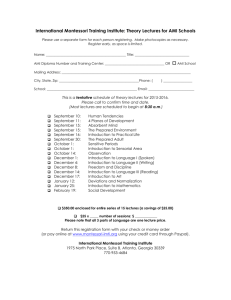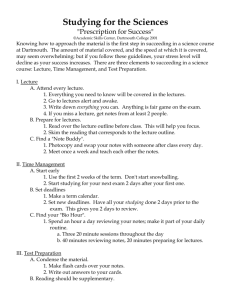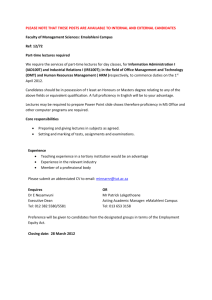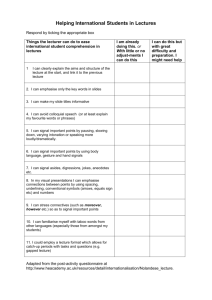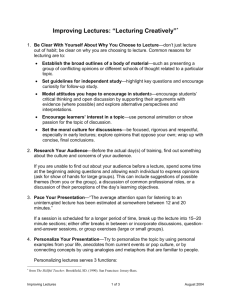Introduction: basic instrumentation
advertisement
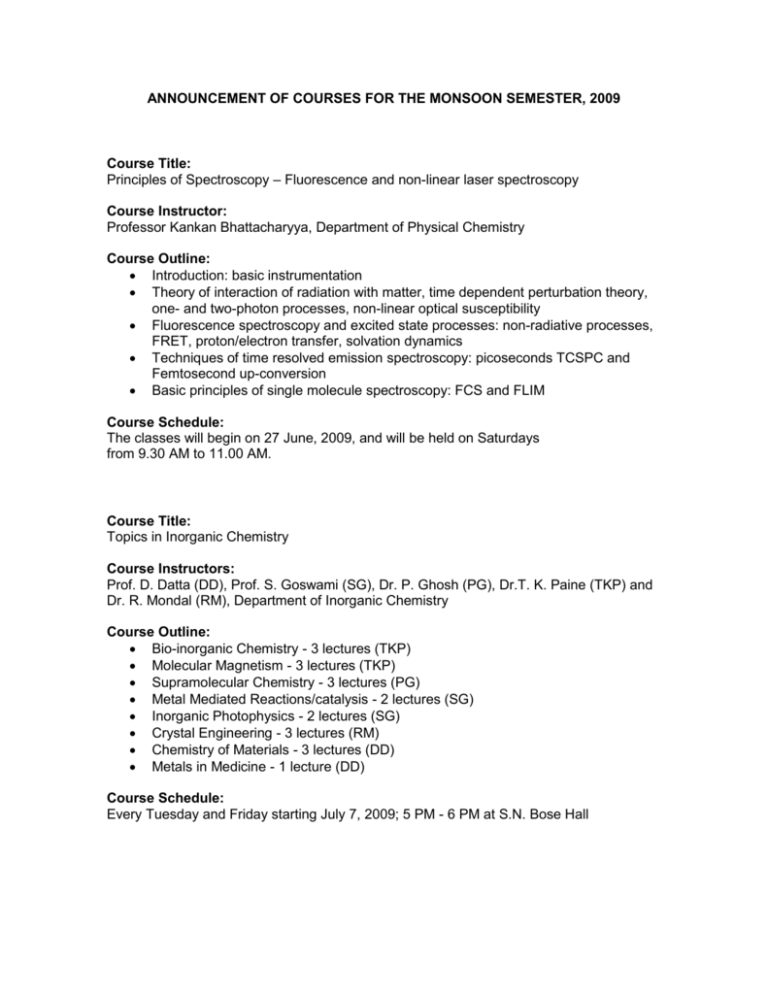
ANNOUNCEMENT OF COURSES FOR THE MONSOON SEMESTER, 2009 Course Title: Principles of Spectroscopy – Fluorescence and non-linear laser spectroscopy Course Instructor: Professor Kankan Bhattacharyya, Department of Physical Chemistry Course Outline: Introduction: basic instrumentation Theory of interaction of radiation with matter, time dependent perturbation theory, one- and two-photon processes, non-linear optical susceptibility Fluorescence spectroscopy and excited state processes: non-radiative processes, FRET, proton/electron transfer, solvation dynamics Techniques of time resolved emission spectroscopy: picoseconds TCSPC and Femtosecond up-conversion Basic principles of single molecule spectroscopy: FCS and FLIM Course Schedule: The classes will begin on 27 June, 2009, and will be held on Saturdays from 9.30 AM to 11.00 AM. Course Title: Topics in Inorganic Chemistry Course Instructors: Prof. D. Datta (DD), Prof. S. Goswami (SG), Dr. P. Ghosh (PG), Dr.T. K. Paine (TKP) and Dr. R. Mondal (RM), Department of Inorganic Chemistry Course Outline: Bio-inorganic Chemistry - 3 lectures (TKP) Molecular Magnetism - 3 lectures (TKP) Supramolecular Chemistry - 3 lectures (PG) Metal Mediated Reactions/catalysis - 2 lectures (SG) Inorganic Photophysics - 2 lectures (SG) Crystal Engineering - 3 lectures (RM) Chemistry of Materials - 3 lectures (DD) Metals in Medicine - 1 lecture (DD) Course Schedule: Every Tuesday and Friday starting July 7, 2009; 5 PM - 6 PM at S.N. Bose Hall Course Title: Quantum Field Theory – II Course Instructor: Dr. Utpal Chattopadhyay, Department of Theoretical Physics Course Outline: Path integral methods of quantisation for i) Quantum Mechanics, ii)scalar field, iii) Dirac field and iv) non-abelian gauge field theories (Fadeev Popov method). Effective action and effective potential at one-loop, Derivation of ColemanWeinberg potential. Renormalisation, n-particle irreducibles, primitively divergent graphs. Dimensional regularisations, phi^4 scalar field theory: two point and four point functions. Basic loop diagrams in Quantum Electrodynamics (QED),computation of electron's magnetic moment using radiative corrections, one-loop renormalisation of QED,counter terms, renormalisation schemes. Beta and Gamma functions, fixed points, renormalisation group, Callan-Symanzik equation. Course Schedule: The lectures will be held on Thursdays at 11:30 AM and on Fridays at 3:00 P.M. The venue is A.K.Raychaudhury Hall. The first class will be held on Thursday, July 2, 2009. Course Title: Weak Interaction and the Standard Model Course Instructor: Dr. Sourav Roy, Department of Theoretical Physics Course Outline: Weak Interaction and (V-A) theory (3 lectures) 2-body and 3-body decay width calculations (4 lectures) Spontaneous symmetry breaking, Goldstone Theorem (3 lectures) Gauge Theory of Weak Interaction - Glashow-Salam-Weinberg Model (6 lectures) Fermion masses, Quark mixing (3 lectures) Neutrino masses and mixing (4 lectures) Course Schedule: Total 23 lectures (each 90 mins duration) Monday and Friday at 11:30 a.m. (A.K. Raychaudhury Hall) Tutorial: wednesday at 11:30 a.m. (A.K. Raychaudhury Hall) Course Title: Chemical Crystallography Course Instructor: Dr. P. Ghoshdastidar, Department of Organic Chemistry Aim of the course: To give an overview of single crystal X-ray diffraction (SCXD) technique to solve small molecule structures. Course Outline: the basics of SCXD without mathematical details; practical training on sofwares used in structure solution and refinement. This couse is only for those students who are willing to credit the course. Interested students should contact the instructor no later than 15th of July, 2009 Course Title: Metal-mediated Organic Synthesis Course instructor: Professor Amitabha Sarkar, Dept of Organic Chemistry Course Schedule: Begins mid-July,'09; Duration: 20-24 lecture hours Course Outline: Polar reactions – story of nucleophilic carbon Metalations – directed metalation – regioselectivity – nuclear vs lateral metalation – acidity trends – reactivity as a function of metal used – Li, Mg, Ti, Cu, Zn, Pd, etc. Coupling reactions, Hydrometalation, Carbometalation Basic mechanistic steps in organometallics – ligand substitution, oxidative addition, migratory insertion, reductive elimination – boron and aluminium hydride reagents – Schwartz’ reagent – transmetalation and catalytic cycle – Hoveyda’s carbometalation Carbanion chemistry - alkylation Stability of carbanion – kinetic vs thermodynamic enolate – where does the metal ion reside? – who decides? – enolate equivalents and in situ generation of enolates regioselectively – stereochemistry of enolate alkylation – asymmetric induction in alkylation – Michael addition – generation and reaction of configurationally stable carbanion Alkenes and Dienes: synthesis and reactions Phosphorus ylides – Peterson olefination – metal carbene complexes – Tebbe reagent as Wittig-equivalent – Petasis’ recipe for in situ generation – intrinsic reactivity difference between Schrock and Fischer carbene complexes – metathesis of alkenes Ring construction tools – Lewis acid mediated cycloadditions Impact of Lewis acid catalysis in stereochemical course of cycloaddition reactions – Diels-Alder reaction and its enantioselective versions – dipolar cycloadditions – chirality transfer in sigmatropic rearrangements – polyene cyclizations Metal-mediated cyclization reactions Doetz benzannulation – Pauson-Khand reaction – alkyne trimerization – pi-allylpalladium as electrophilic terminus for intramolecular nucleophilic addition – “trimethylenemethane” additions – RCM as ring-construction strategy Stereoface-differentiating reactions on metal template Alkene and polyene complexes of metals – ‘heptacity’ – arene-chromium complexes – selectivity in pi-allylpalladium mediated reactions – iron and molybdenum diene and dienyl complexes – application in synthesis Course Title: Physics of Soft Matter Course Instructor: Professor Surajit Sengupta, Centre for Advanced Materials Course Outline: Review of Stat. Mech. basics; distribution functions in phase space, BBGKY and YBG hierarchies, concepts of equilibrium and approach to equilibrium, ensembles. (3 lectures) Structure of various soft matter systems solids, liquids, meso-phases, microemulsions etc. (2 lectures). Distribution function theories: Mayer clusters, PY, HNC etc. Perturbation theory. (4 lectures) Density wave theory, mean field approaches to freezing. (3 lectures) Disordered systems, ergodicity breaking, replica trick and replica symmetry breaking. (3 lectures) Hydrodynamics of condensed matter systems, slow and fast variables, S(q,w), modes and mode structures of solids, liquids and meso-phases. (6 lectures).



